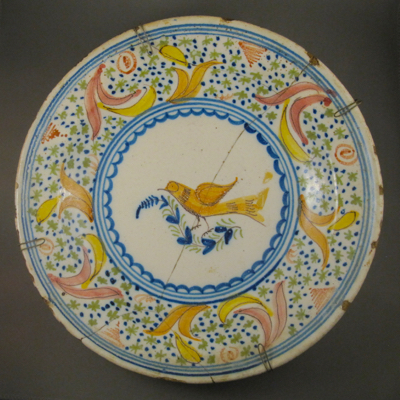Posts Tagged ‘pottery’
Saturday, February 6th, 2016
This small cylinder form mocha ware tavern mug was made in England in the mid-1800s and stands just 4 inches tall. It is decorated with blue & black bands and a broad teal ground with a bold seaweed pattern.
I’m guessing that the original handle of this mug broke off during a particularly rough bar room brawl. Luckily, a local tinker, sometime in the third quarter of the 19th century, was able to bring it back to life by adding an iron replacement handle with support bands.
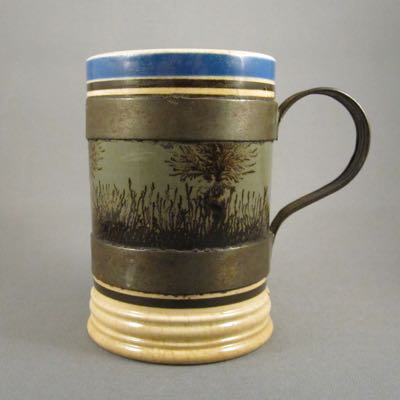
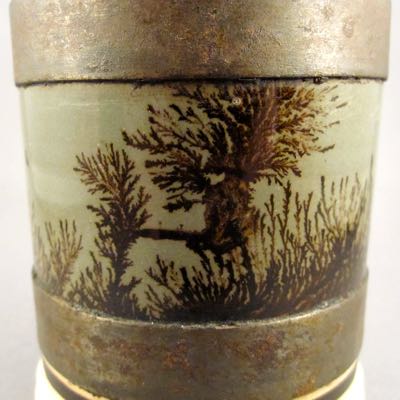
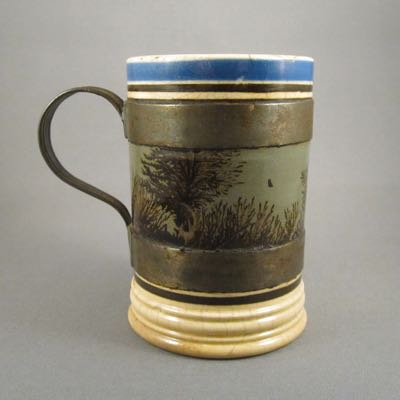
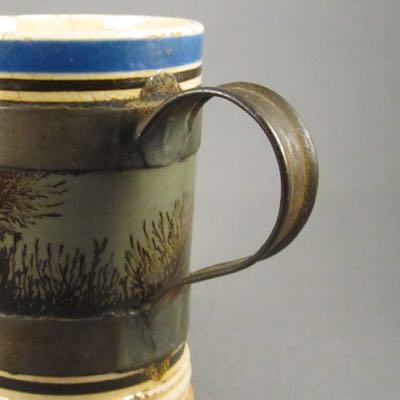
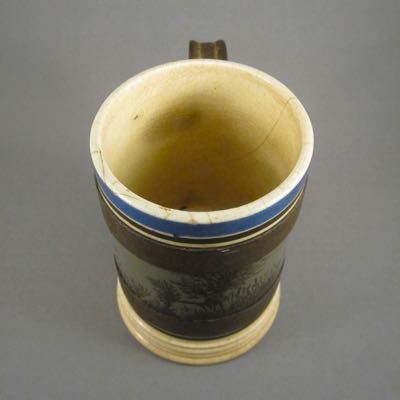
Similar mocha ware mugs and jugs can be seen on the bottom shelf behind the counter in this late 19th century photo.

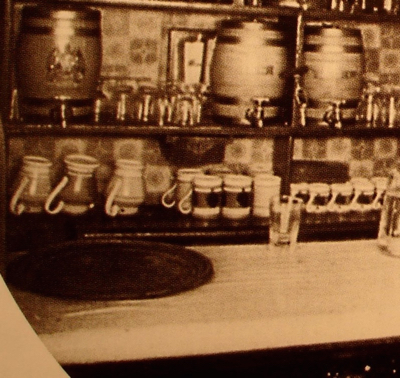
Photo courtesy of Martyn Edgell
This is what the original loop handle on my mug would have looked like prior to the brawl.
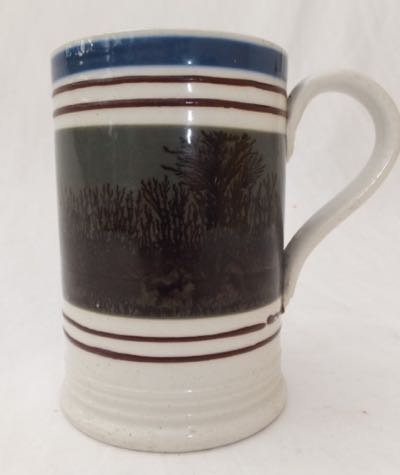
Photo courtesy of The Antique Dispensary
Tags:English, metal handle, pottery
Posted in mug/tankard | 2 Comments »
Saturday, October 17th, 2015
This colorful soft paste baluster form commemorative jug was made in England around 1840 and is decorated with a figure of William of Orange on horseback, figures showing brotherly love, a crown, flowers and Protestant emblems. It has polychrome glazed black transfer decoration, hand painted flowers and pink lustre trim, measuring 6 inches tall and 7-3/4 inches wide from handle to spout.
After the original handle broke off, a tinker secured the sturdy copper replacement handle to the body using two flat screws. See an earlier post, Inventive repairs at the Rijksmuseum, showing a painting, Prince’s Day by Jan Havicksz Steen (1625-1679), depicting the birthday celebration of Prince William III of Orange-Nassau on November 14, 1650.
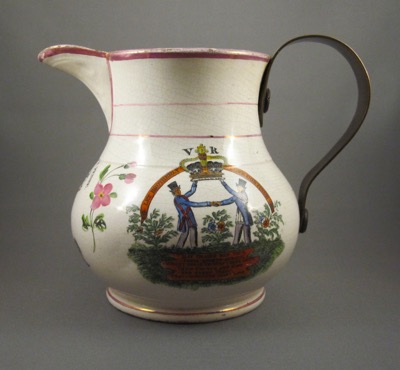
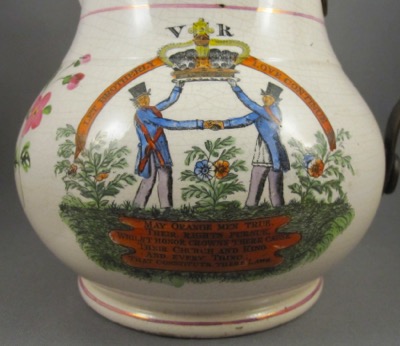
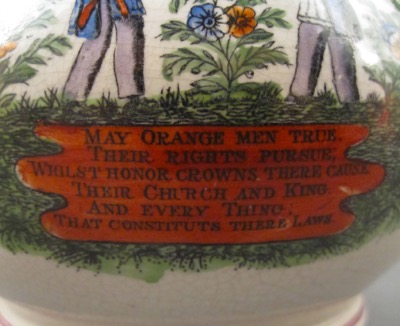
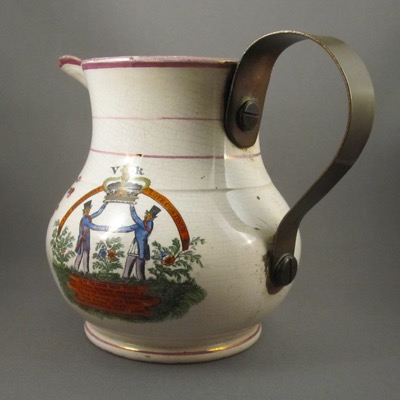
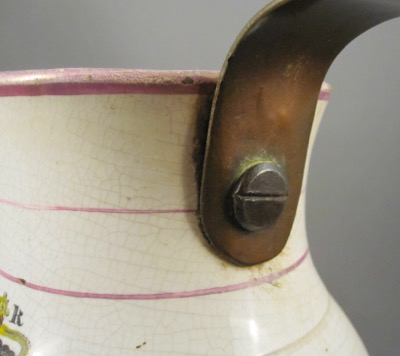
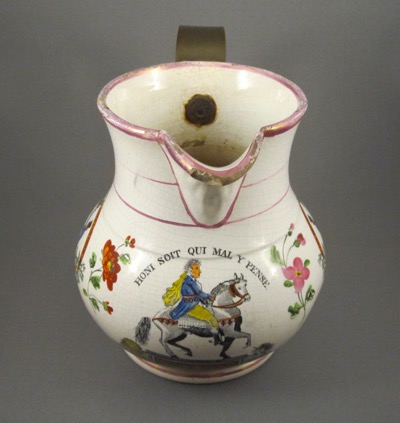
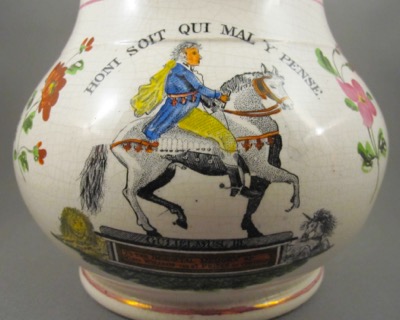

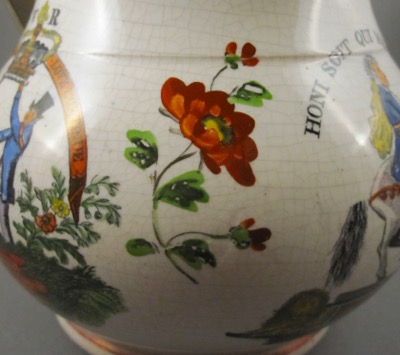
This jug with the same transfer decoration still has its original handle intact.
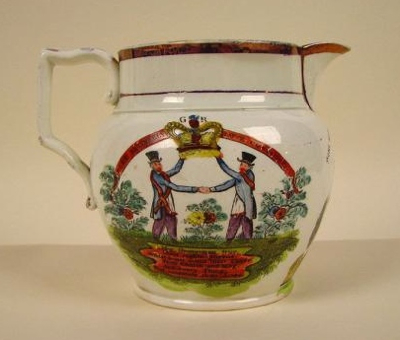
Photo courtesy of eBay
Tags:commemorative, English, lustre, metal handle, pottery, soft paste, transferware
Posted in jug | No Comments »
Saturday, August 1st, 2015
It’s obvious why there are so many early children’s ceramics with inventive repairs. Before the invention of bakelite and plastic, children used smaller versions of adult sized ceramics, and their little hands could barely hold these fragile vessels, especially when filled with hot liquids. So could you really blame these poor innocents when many a mug, plate and glass slipped away, ending up shattered on the floor?
This child’s mug is clearly titled with the 16th century English proverb “MAKE HAY WHILE THE SUN SHINES” and has brown transfer decoration of a farming scene with a pink lustre ring along the rim. It was made in the Staffordshire region of England in the first quarter of the 19th century and measures 2.25 inches high. After the handle broke off, it was taken to a tinker who fashioned an ear shaped metal replacement handle and support bands. A triangular piece from another cup was patched in along the top to replace a lost chip. In my humble opinion, the repairs add character to this wounded survivor, making it much more interesting than a “perfect” one.
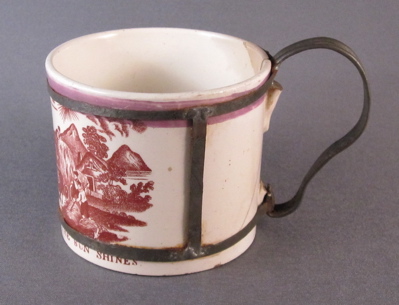
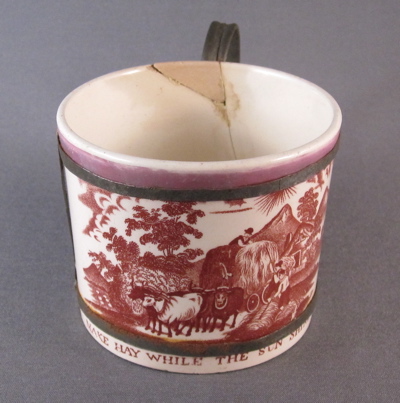
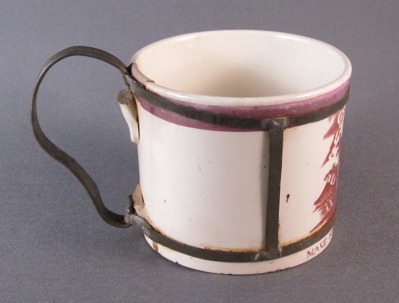
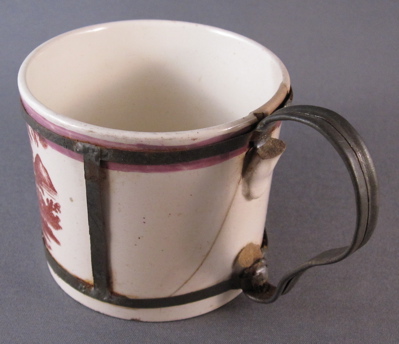
This mug with identical form and decoration shows what the original handle on mine would have looked like before it took a tumble.
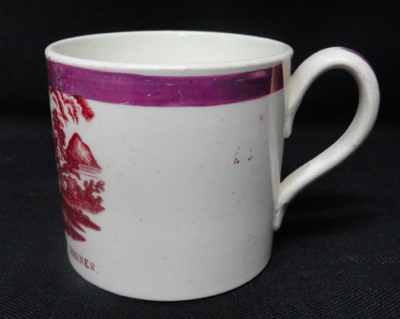
Photo courtesy of Ruby Lane
Tags:English, lustre, metal handle, pottery
Posted in mug/tankard | 4 Comments »
Saturday, April 25th, 2015
I am back in London for a brief visit on my way to Ireland and the very first thing I did upon arrival was to head over to see the magnificent ceramics collection at the Victoria & Albert Museum. I could spend an entire day peering into the endless floor to ceiling glass cases filed with worldwide and world-class ceramics. Here are some of my favorite examples of inventive repairs found among the collection.
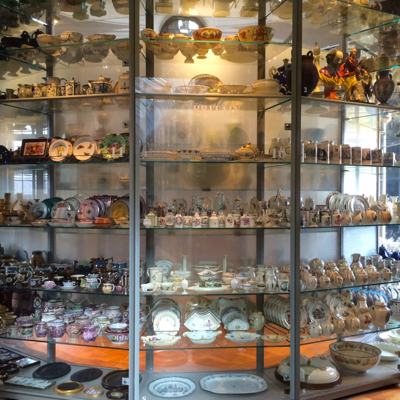
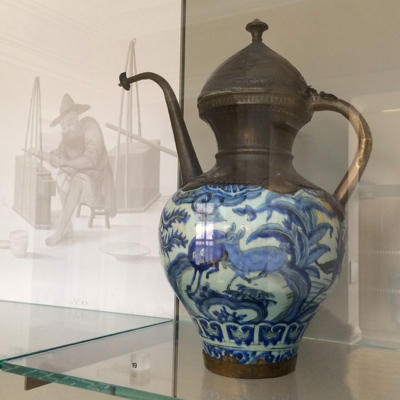
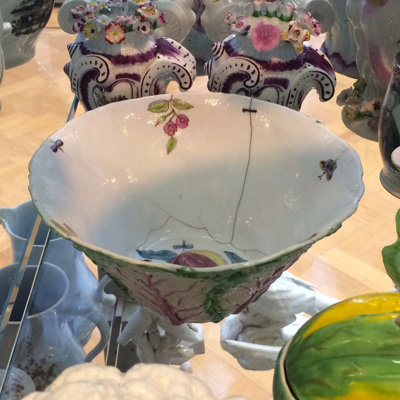
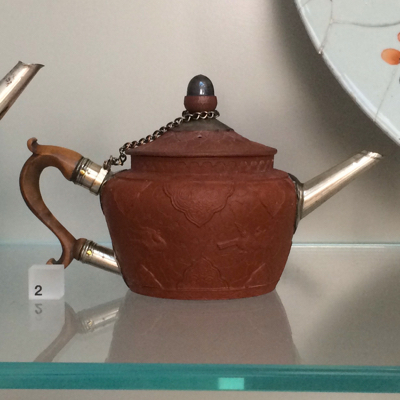
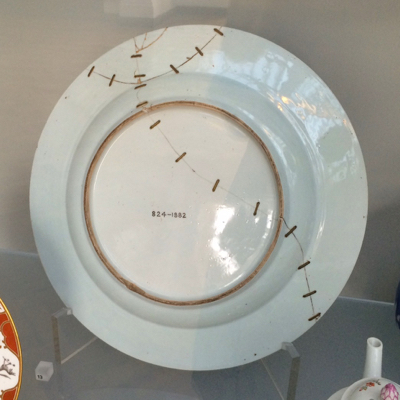
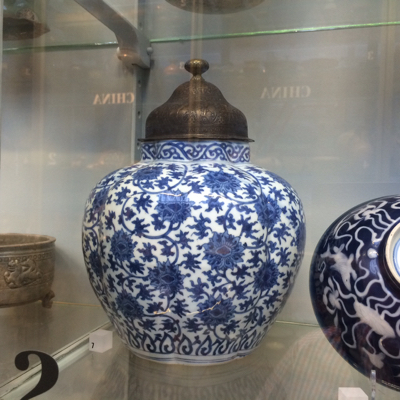

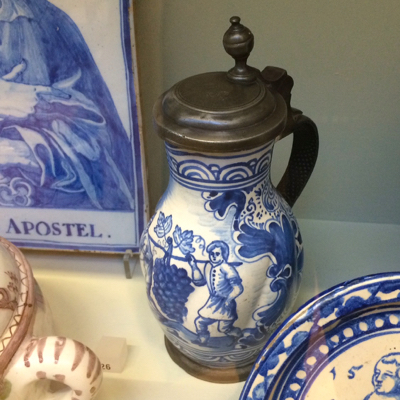
Take a look at this previous post from just over a year ago, showing other examples from the collection.
Tags:blue & white, brass, bronze, Chinese, metal handle, porcelain, pottery, silver, staples/rivets
Posted in anecdotal | No Comments »
Saturday, April 18th, 2015
This heavy salt glazed stoneware ale jug was made in Mortlake, London, in the late 1700s to early 1800s. It has an attenuated baluster shape with applied sprigged decoration including a panel of “The Two Boors”, horses and hounds, classical figures, trees and a windmill on a mound. It stands 8″ high and has a rilled neck and a narrow base, much of which has been chipped away.
It’s apparent that the original handle is long gone but luckily for me, a tinsmith in the 1800s fashioned a wonderful metal replacement handle. It has crimped edges for extra support and a finger rest for comfort when tightly gripped. I imagine the original owner and a chum were inspired by the front panel depicting “The Two Boors”, drank too much ale and dropped the jug. But if it weren’t for our ancestors who drank to excess, my collection of ale jugs with inventive repairs would be minimal to nonexistent.
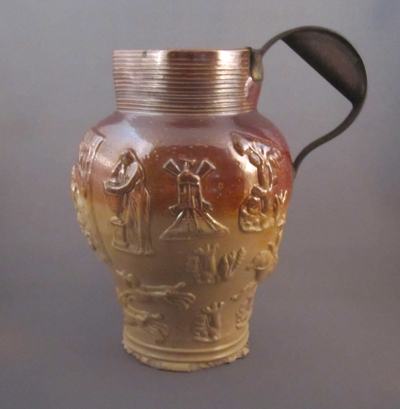
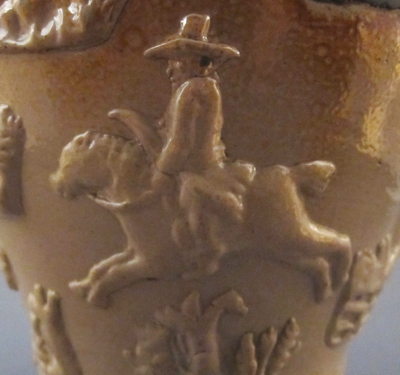
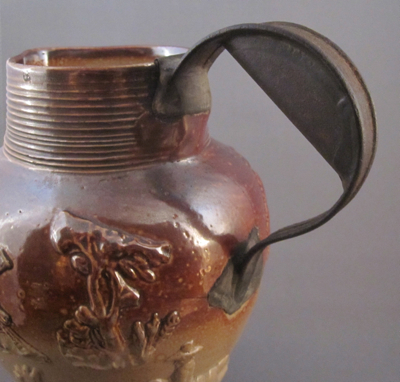
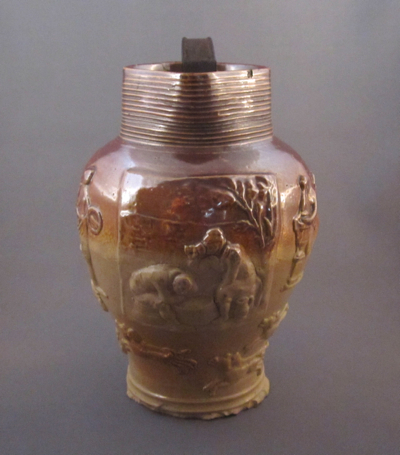
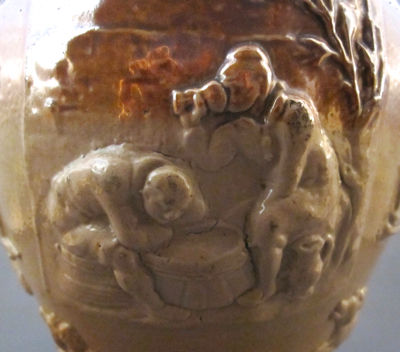
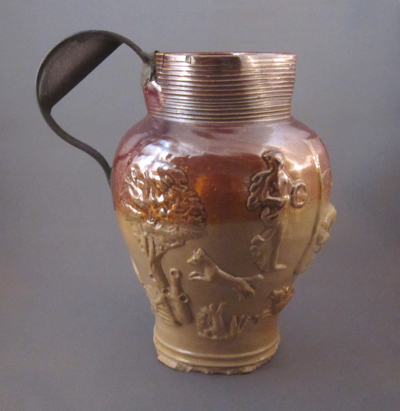
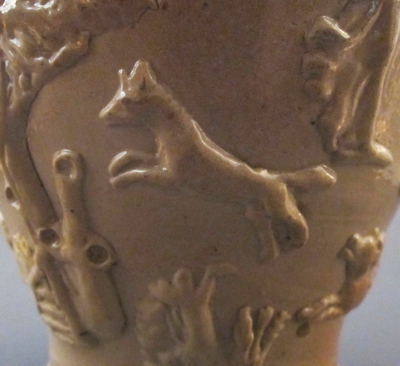
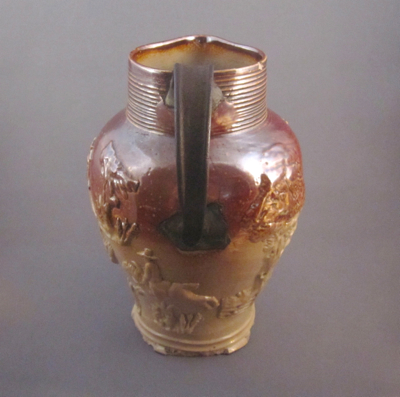
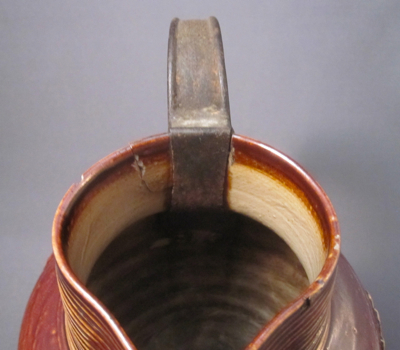
This jug of similar form has its original handle intact.
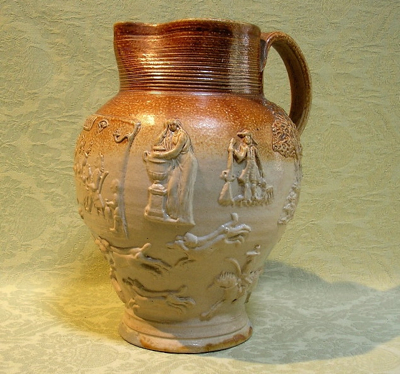
Photo courtesy of Nest Egg Antiques
Tags:English, metal handle, pottery, salt glaze, stoneware
Posted in jug | No Comments »
Saturday, April 11th, 2015
Earlier this week I took a stroll through one of my favorite spots in Manhattan, The Henry R. Luce Center for the Study of American Art at The Metropolitan Museum of Art. If the Smithsonian Museum is known as “The Nation’s Attic”, then I’d like to christen the Luce Center “The City’s Yard Sale” as it is packed from floor to ceiling with glass showcases filled with over 18,000 tchotchkes, including Tiffany lamps, Shaker boxes and Revere silver. This impressive collection of the museum’s overflow allows the public to research and take a peek into the MET’s closets. If you look closely among the rare Chinese porcelain and early English pottery you will find dozens of pieces in various states of disrepair including visible cracks, chips, worn paint and missing parts.
Here are some of my favorite make-do’s, all hoping to one day escape the confines of the study center’s curio cabinets and be placed alongside their more presentable friends in the “big house.”
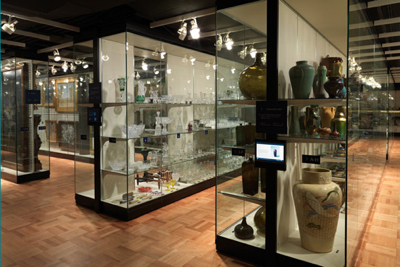

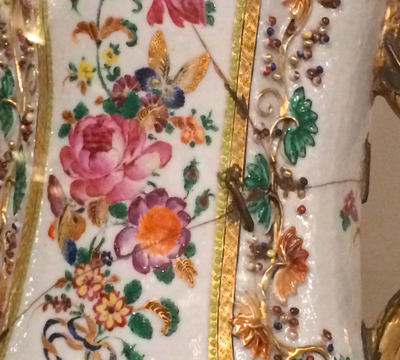
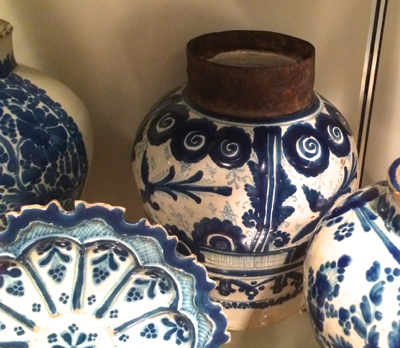
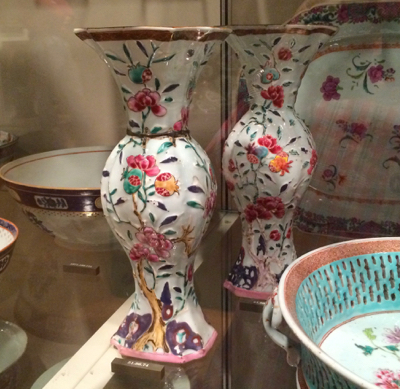
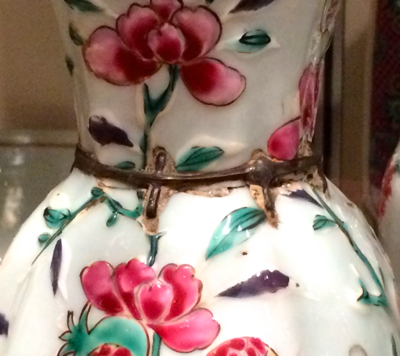
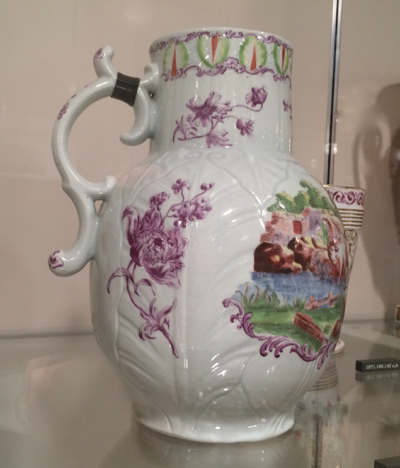
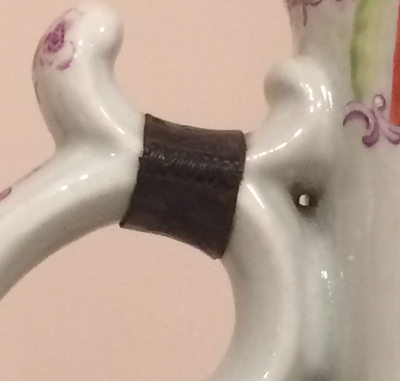
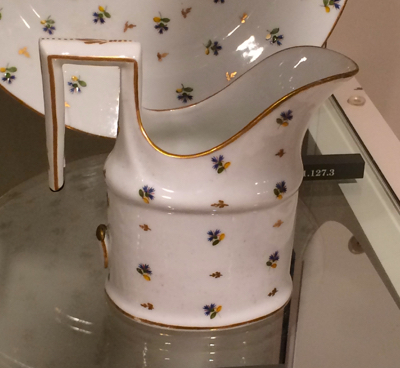
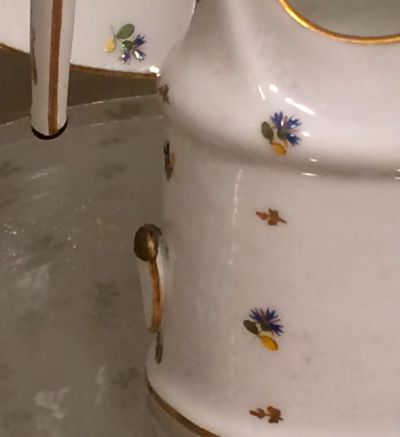
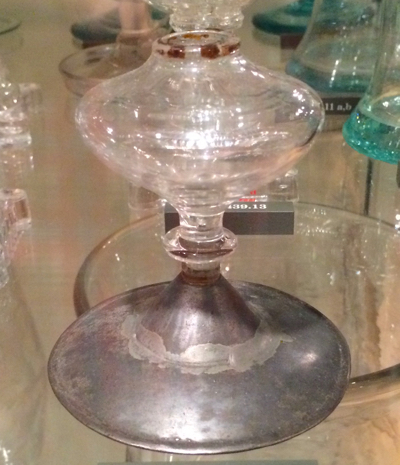
Tags:blue & white, bronze, Chinese, English, glass, metal base, metal handle, porcelain, pottery, staples/rivets
Posted in anecdotal | 2 Comments »
Friday, March 27th, 2015
This mochaware slip banded jug with concentric thin black rings and wide drab and blue bands measures 6″ tall and has a flared base. It was made in England in the mid-1800’s and has a poorly made 20th century replacement handle made of clay compound formed over a metal armature. I applaud those who attempt to repair broken ceramics using the same techniques as 19th century tinkers but I would like to strip away the compound and expose the metal handle on this otherwise striking jug.
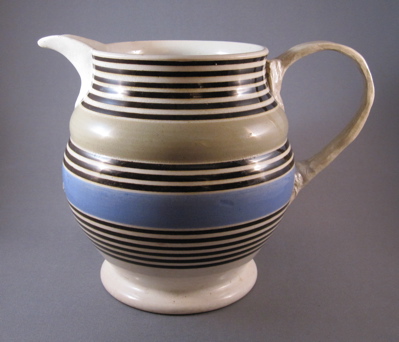
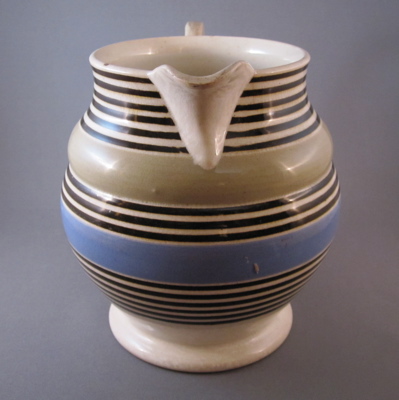
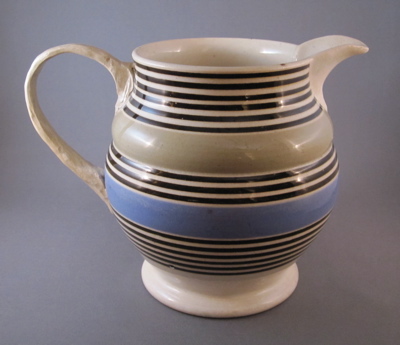
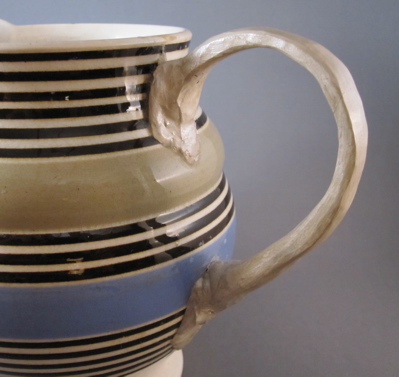
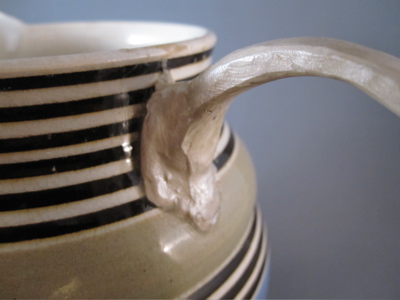
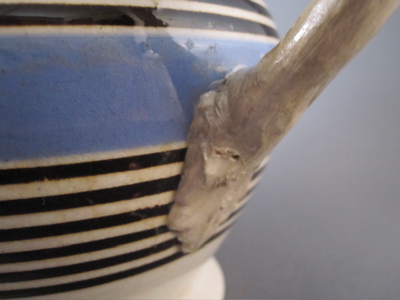
The original loop handle on my jug would have looked like the handle on the jug below with similar form and decoration.
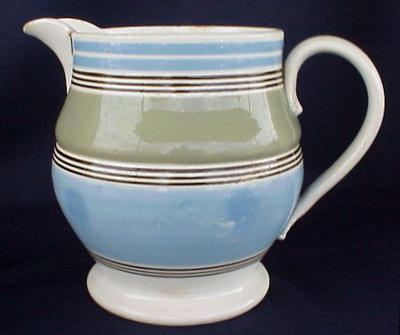
Photo courtesy of Burchard Galleries
Tags:English, metal handle, pottery
Posted in jug | 2 Comments »
Sunday, January 18th, 2015
I am a big fan of commemorative pottery, particularly ones with strong graphics and bright colors. Whenever I spot an example from afar in a shop, I secretly hope that it has some sort of inventive repair. Sometimes I get lucky. This creamware mug with printed transfer and hand colored decoration boasts the message “Peace of Europe Signed at Paris May 30, 1814.” Made in 1814 by Bristol Pottery in England to celebrate the signing of the peace treaty marking the end of war with France, this mug measures 4-3/4″ tall and 5-1/4″ wide to end of handle. Check out the details in photos showing the Bristol Pottery mark, the factory in the background, and ships with wood crates no doubt filled with pottery for export.
This mug possesses numerous battle scars, including chips, cracks, and the loss of its original loop handle. After the handle broke off, a 19th century tinker replaced it by drilling through the body and attaching a metal replacement with two square fasteners. To add insult to injury, the replacement handle is covered in rust, a result of further neglect. But if this mug were in “perfect” condition, I would not have purchased it.
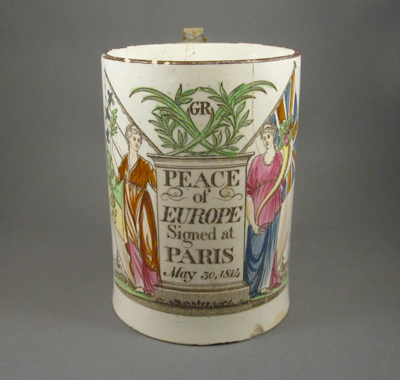
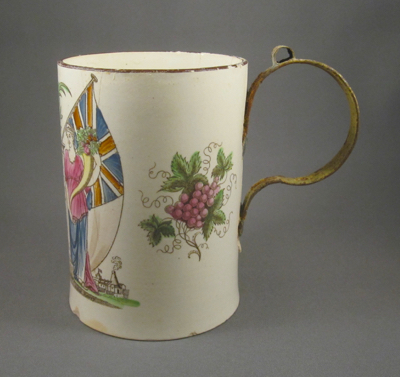
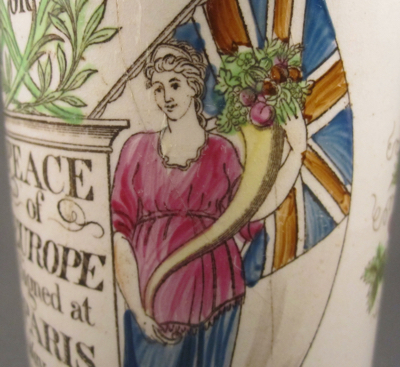
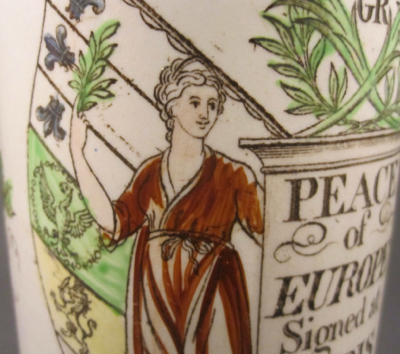
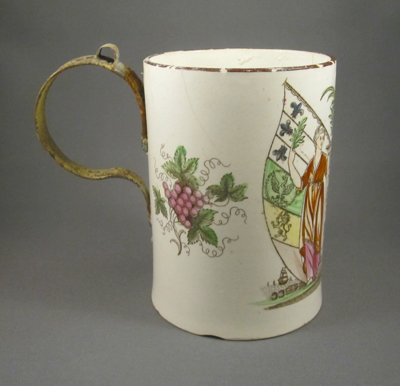
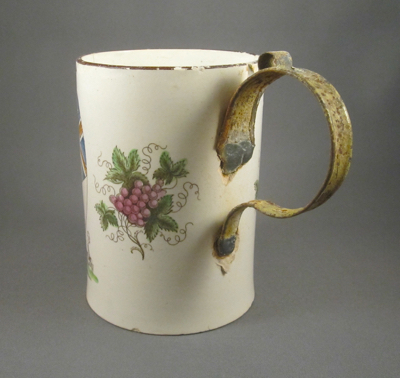
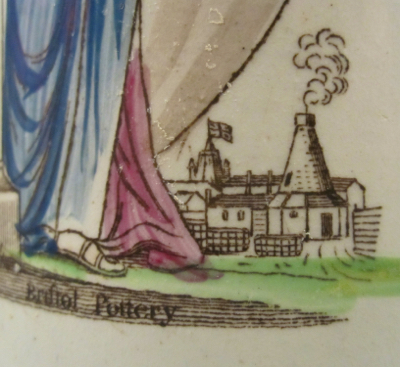
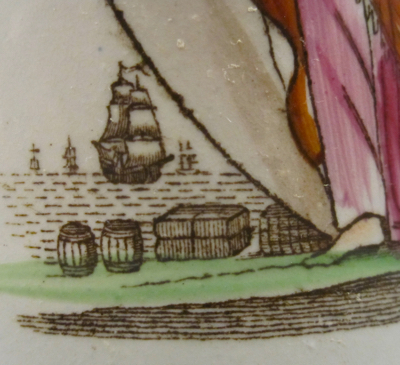
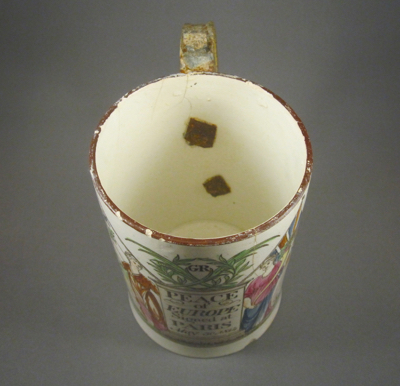
This example, with different copy and overglaze coloring, can be found in the collection of the British Museum in London.

Tags:commemorative, creamware, English, metal handle, pottery
Posted in mug/tankard | 4 Comments »
Sunday, December 21st, 2014
Wishing you all the best during the holiday season and for a healthy and Happy New Year!
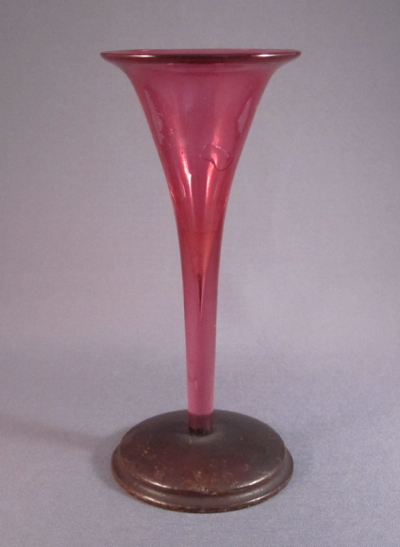
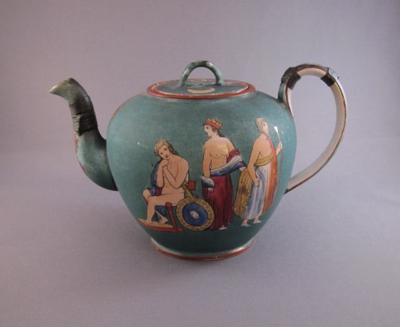
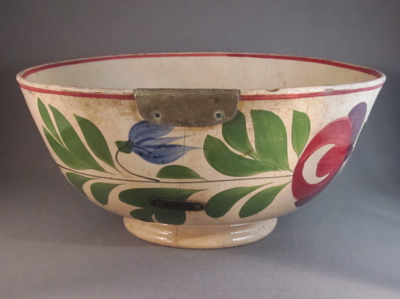
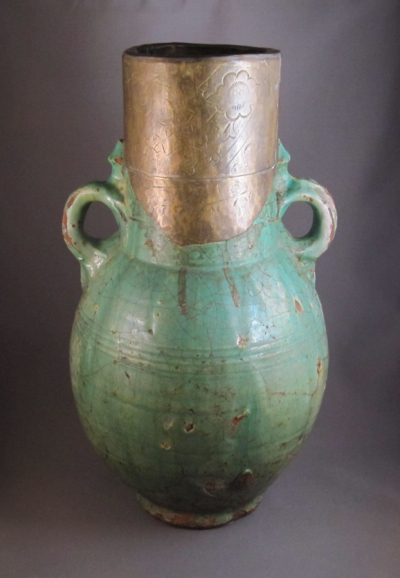
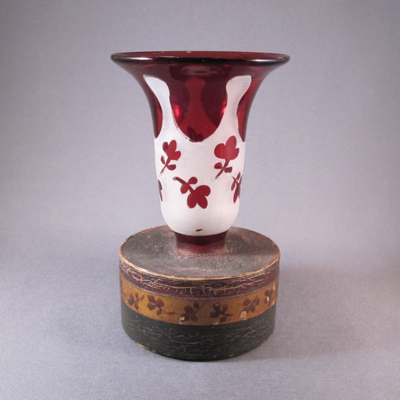
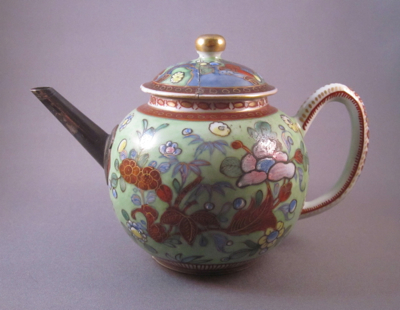
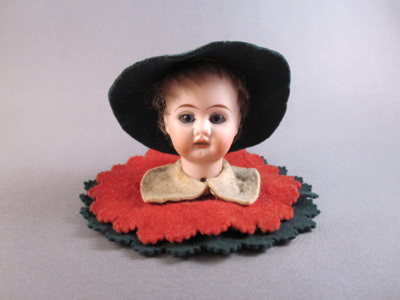
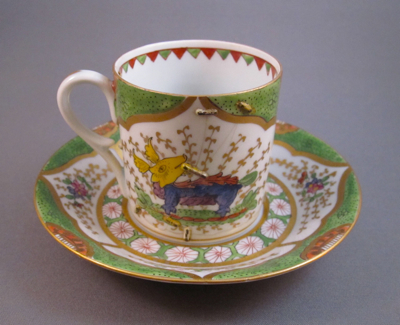
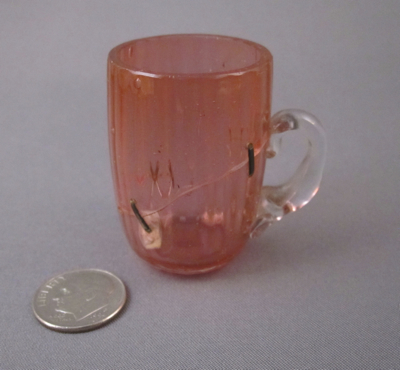
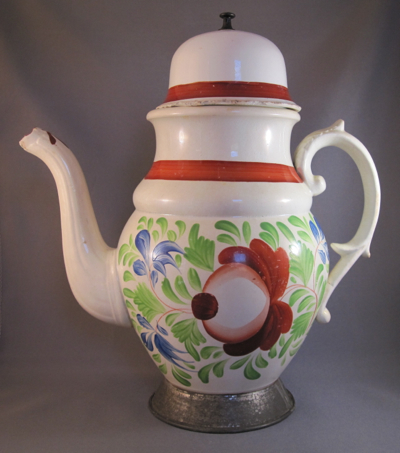
Tags:Chinese, clobbered, English, German, glass, globular, metal base, miniature, porcelain, pottery, silver, staples/rivets, wood base
Posted in bowl/dish, chocolate/coffee pot, cup/saucer, jug, plate/platter, teapot, toy, vase/vessel | 8 Comments »





































































